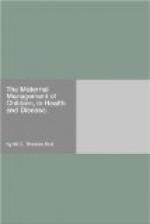I would recommend a plain, generous, and nutritious diet; not one description of food exclusively, but, as is natural, a wholesome, mixed, animal, and vegetable diet, with or without wine or malt liquor, according to former habit; and, occasionally, where malt liquor has never been previously taken, a pint of good sound ale may be taken daily with advantage, if it agree with the stomach. Regular exercise in the open air is of the greatest importance, as it has an extraordinary influence in promoting the secretion of healthy milk. Early after leaving the lying-in room, carriage exercise, where it can be obtained, is to be preferred, to be exchanged, in a week or so, for horse exercise, or the daily walk. The tepid, or cold salt-water shower bath, should be used every morning; but if it cannot be borne, sponging the body withsalt-water must be substituted.
By adopting with perseverance the foregoing plan, a breast of milk will be obtained as ample in quantity, and good in quality, as the constitution of the parent can produce, as the following case proves:
On the 17th September, 1839, I attended a lady twenty-four years of age, a delicate, but healthy woman, in her first confinement. The labour was good. Every thing went on well for the first week, except that, although the breasts became enlarged, and promised a good supply of nourishment for the infant, at its close there was merely a little oozing from the nipple. During the next fortnight a slight, but very gradual increase in quantity took place, so that a dessert spoonful only was obtained about the middle of this period, and perhaps double this quantity at its expiration. In the mean time the child was necessarily fed upon an artificial diet, and as a consequence its bowels became deranged, and a severe diarrhoea followed. A wet-nurse was advised for the child as the only means of saving its life, and change of air for the mother as the most likely expedient (in connection with the general treatment pointed out above) for obtaining a good breast of milk. Accordingly, on the 5th October, the patient, taking with her the infant and a wet-nurse, went a few miles from town.
For three or four days it was a question whether the little one would live, for so greatly had it been reduced by the looseness of the bowels that it had not strength to grasp the nipple of its nurse; the milk, therefore, was obliged to be drawn, and the child fed with it from a spoon. After the lapse of a few days, however, it could obtain the breast-milk for itself; and, to make short of the case, on the 25th of the same month, the mother and child returned home, the former having a very fair proportion of healthy milk in her bosom, and the child perfectly recovered and evidently thriving fast upon it.
Where, however, there has been an early deficiency in the supply of nourishment, it will most frequently happen that, before the sixth or seventh month, the infant’s demands will be greater than the mother can meet. The deficiency must be made up by artificial food, which must be of a kind generally employed before the sixth month, and given through the bottle. If, however, this plan of dieting should disagree, the child must, even at this period, have a wet-nurse.




